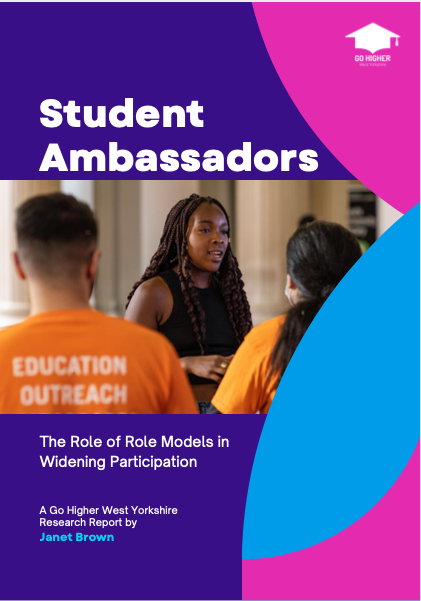Student Ambassadors: the role of role models in Widening Participation

Introduction
“I think [young people] kind of trust us more… I think being similar in age, it’s also kind of more like a conversation you’d maybe have with… [a friend] you’ve just met” – Study Participant
A Go Higher West Yorkshire (GHWY) research report authored by former Data, Impact and Evaluation Manager Janet Brown drew from both primary qualitative research and wider academic literature to explore the way in which student ambassadors function as role models to the young people with whom they work. It outlined key considerations in ensuring ambassadors are effective as role models, as well as provided several recommendations for Higher Education Providers (HEPs) to adopt good practice when recruiting student ambassadors to carry out outreach activity.
Report findings
Student ambassadors are a central asset to Widening Participation (WP) work, with data collected suggesting that they play a crucial role in how young people experience Higher Education (HE) outreach.
The report points out that student ambassadors can provide ‘insider’ knowledge about HE that young people may not have had access to beyond traditional marketing materials, especially those who are the first in their family to progress to HE and those from underrepresented backgrounds. It is recommended that this insight is discussed during one-to-one or small group interactions, with young people more likely to view ambassadors as role models within these settings as opposed to anything more formal, such as lectures.
Levels of trust in student ambassadors are also high. Findings indicate that young people felt that the information, advice and guidance provided by student ambassadors gave a ‘realistic view’ of life at university. This is in part because student ambassadors are perceived to exist outside of a HEP’s formal recruitment structure and are often viewed as an ambassador for HE more generally, rather than for a specific HEP. The authenticity that student ambassadors offer is thought to play a central part in young people relating to them and taking on board what they say.
One of the key recommendations mentioned in the report focused on the importance of recruiting a diverse student ambassador cohort that reflects the diversity of the HE student population. Several ambassadors mentioned that they themselves entered HE via a non-traditional route or came from a disadvantaged background, which was a motivating factor for taking up the role. They also mentioned that, while at university, there were limited encounters with role models ‘like them’, which lends to the importance of ensuring the next generation of students has visible role models that they didn’t experience while at university. Crucially, this means that a diverse HE community, representing a variety of backgrounds, should be reflected within the selection of student ambassadors.
What’s next for the role of student ambassadors in outreach activity?
In 2022, attainment raising outreach became a new priority as the Office for Students (OfS) asked providers, both through Access and Participation Plan (APP) delivery and Uni Connect delivery, to focus on raising attainment in schools. GHWY has developed an evidence-based, collaborative project, called Think and Go Higher, which is focussed on raising attainment through metacognition: asking participants to reflect on what they already know, and to practice self-regulation to help manage how students go about their learning. In particular, the Think and Go Higher programme provides an interesting backdrop for the role played by student ambassadors, and how their authentic involvement in our programme delivery will support students to strive to improve their academic achievement and ultimately consider HE as a place where they can succeed.
Further information
Download a copy of the report.
If you have any questions about the report, please contact Phoenix Nacto, Project Officer (Qualitative) at k.nacto@leeds.ac.uk
